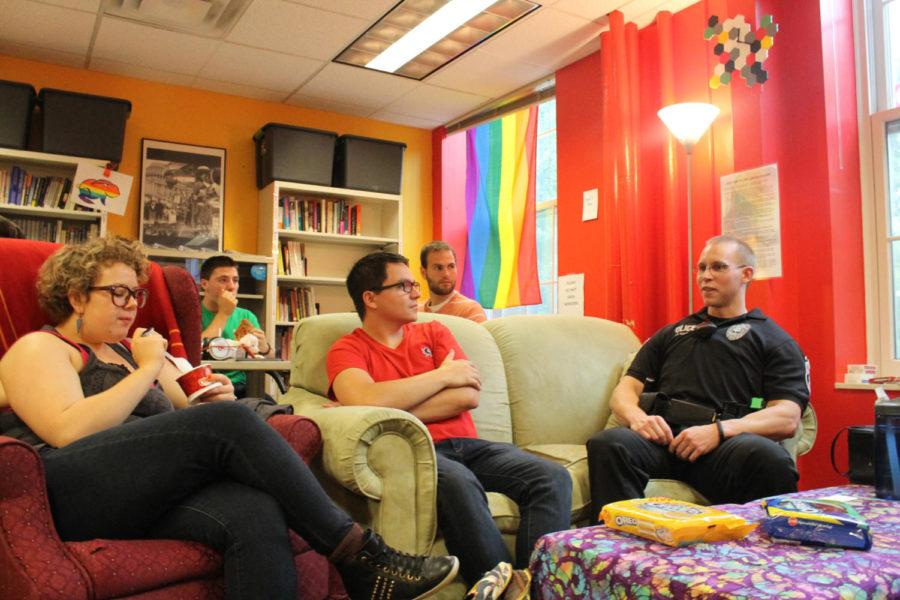LGBTQA Q&A fosters relationship with ISU Police
Meredith Kestel/Iowa State Daily
Lt. Joshua Hale of the ISU Police Department answers questions for members of the LGBTQA community Sunday. ISU Police stressed the importance of feeling comfortable on campus and around Ames, and officers wants that safety to encompass all students.
September 8, 2014
The ISU Police Department outlined its plans to build a relationship with LGBTQA community at a question and answer session with LGBTQA members Sept. 8.
The Q&A session was a way for ISU Police to reach out and grow a better relationship with the LGBTQA community. A police liaison officer discussed why it is important to be involved with the community, resources available on campus and ways to be safe when in the Ames community.
“It kind of can develop that one-on-one interaction,” said Lt. Joshua Hale with ISU Police. “I’ve had many situations where students were more comfortable talking to me, having met me at some type of event and having someone familiar to interact with.”
Hale stressed that all 37 ISU officers, dispatch and any department employees are trained in the Safe Zone, a program to eliminate homophobia, transphobia and heterosexism at Iowa State.
“We kind of tailored it towards law enforcement,” Hale said of the Safe Zone program. “Students that might identify as LGBTQA or something else, they may not be presenting as their drivers license shows.”
Hale said the department strives to be sensitive and understanding about a student’s appearance as well as understanding of how to make interaction comfortable for members of the LGBTQA community.
Brad Freihoefer, director of LGBTQA Student Services, was also at the Q&A. Along with Hale, they talked about resources available to the community through ISU Police.
“Our office works with students, any issue kind of related and intersecting with sexuality and gender,” Freihoefer said. “The LGBTSS Center focuses on programs, services, referrals and resources focused on gender at Iowa State. I meet individually with students who are navigating the coming-out process or looking for resources and support services on campus.”
As for police resources, Hale discussed resources available during the day, including Student Counseling Services. He also mentioned LGBTQA-friendly therapists and psychologists in the Ames community.
At night, he said resources are a bit sparse, but Mary Greeley Medical Center is always available if someone needs help. If it is an issue that may put someone in danger, he said students should call ISU Police with any concerns.
Another resource for students discussed was an escort service that runs from 6 a.m. to 6 p.m. Hale said anyone who isn’t comfortable on campus can use these services to get a ride back to your dorm or apartment.
Lt. Hale also talked about specific ways to report crimes or concerns on campus.
“Just stop in or call our dispatch line. Twenty-four hours a day, someone will always answer the phone,” Hale said. “The dispatchers are all Safe Zone-trained. We’ll send an officer. If it’s an immediate issue, or an emergency, call 911.”
Dan Carney, graduate student in education, asked about reporting both to Iowa State and ISU Police.
“If it happens on campus, it goes to us. If you report it to us, it automatically gets reported to the university, so you don’t have to make two stops.” Hale answered. “So if you go to judicial affairs first, they’ll probably report it to us anyway.”
Hale also addressed the issue of students wanting to remain anonymous or those concerned about possibly being outed as members of the LGBTQA community.
While some crimes like sexual assault, for example, must be documented, Hale assured students that the department tries its best to protect the privacy of students with whom they interact.
“If you have any questions, you can send me emails, you can call and leave messages at the office if you have immediate concerns that need addressing,” Hale says.







